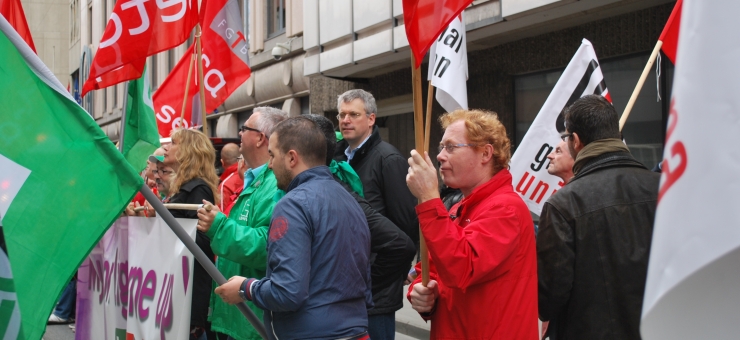Spotlight shed on working conditions in call centers

On 20 October, the UNI Global Union call-center action week kicked off.
Since 2006, UNI Global Union (the global union for workers in the service sector) organises during the month of October a major campaign in call centers. From October 20 to 25, UNI Europa affiliates relay the campaign at company level to improve working conditions in this highly competitive sector. The 2014 edition focuses on the importance of union representation in call centers. Indeed, delegates are first in line to ensure that working conditions are decent for all workers.
On 20 October, in Belgium, the CNE / LBC-NVK, SETCa CGSLB and unions take common action to demand better union representation for workers in call centers. Actions are held around the country. The common actions started on Monday: activists show their support for operators in a call center of the capital, where job insecurity reigns. 200 militants SETCa and CNE / LBC-NVK services demonstrated in Etterbeek in front of the company Benelux Assist. The call center was not chosen at random. The company in question still has no union representation, mainly because of the abundance of precarious and temporary contracts. Collective bargaining is not possible. This is a common situation in call centers and it perfectly illustrates the chosen theme for this year’s common action.
Other actions will follow throughout the week in the major Belgian cities from Brussels, Charleroi, Antwerp, Leuven, Liège, Hasselt, etc. in the following companies: IPG / SNT, WBCC, Target power, Carglass In2com Unamic , Touring, Telenet, N-Allo, De Stroomlijn, Mobistar, and many others, including banking and insurance.
Trade unions jointly leaflet and give out flashlights to shed light on the working conditions in operator companies.
Oliver Roethig, UNI Europa Regional Secretary, who joined the common action in Brussels said: “Workers need to organise and join unions to improve their working conditions, especially as contact center workers suffer from poor working conditions!”
The Press Release is annexed.

